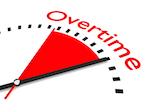Employees who are owed overtime pay in Nevada may file a civil lawsuit against the employer in pursuit of:
- back pay plus interest,
- court costs and attorneys’ fees,
- punitive damages (if the employer acted maliciously or in a retaliatory way), and
- liquidated damages (in federal court)
If there is more than one employee who is owed back pay, they may be able to band together to bring a class-action lawsuit for overtime pay. Class actions can be a more efficient and cost-effective approach to litigation, especially when the individual employees are not owed substantial back pay.
In this article, our Las Vegas Nevada labor law attorneys discuss:

1. Summary of Nevada overtime pay laws
Employers are generally obligated to pay employees for every hour they work. And if the employees work overtime, the employer generally has to pay them 1.5 times their typical hourly wage for every hour of overtime worked. This overtime wage is commonly called “time and a half” pay.
A worker may be eligible for overtime in Nevada in either of the following two situations:
- the employee works more than 40 hours in a week; or
- the employee works more than 8 hours in a 24-hour period and the employee normally earns less than 1.5 times the Nevada minimum wage[1]
Nevada’s minimum wage is $12.00 and hour, and the minimum overtime rate is $18.00 an hour.
1.1. Exempt employees:

Only “non-exempt” employees are entitled to time and a half overtime pay in Nevada. In general, non-exempt employees include blue-collar workers.
Meanwhile, white-collar workers in professional, executive, or administrative positions are usually exempt from overtime benefits. Other professions that are typically exempt from receiving time and a half overtime pay include:
- Taxi and limo drivers,
- Automobile salespeople and mechanics,
- Farmworkers,
- Employees of businesses with a gross sales volume of less than $250,000 annually,
- Certain employees in a retail or service business, and
- Domestic servants who live where they work and agree in writing to forgo overtime pay[2]
Learn more about Nevada overtime pay laws, the misclassification of employees as independent contractors in Nevada, and the misclassification of non-exempt employees as exempt in Nevada.
2. Filing a lawsuit for overtime pay in Nevada
Workers in Nevada who are owed overtime pay have two (2) years to sue the employer for unpaid wages.[3] Depending on the case, the worker (“plaintiff”) can file in the local Nevada district court or federal district court.
Since litigation is very complicated, it is highly recommended that workers retain an experienced labor law attorney to handle the paperwork. At a minimum, lawsuits require filing a complaint. Then the plaintiff may have to file responses if the employer files a motion to dismiss or a motion for summary judgment.

The majority of civil cases settle out of court. But if the two sides cannot come to an agreement, the case may proceed to trial. The plaintiff would then have the burden to prove to the judge or jury by a preponderance of the evidence that the employer owes back pay.
Filing a lawsuit is often an effective way to recover back pay as long as the plaintiff has a strong case. However, the time and expense of litigation are often a deterrent to workers, especially if they are owed relatively small amounts of money. But if there is more than one employee owed overtime pay, they may want to consider banding together to form a class action lawsuit, discussed below:
2.1. Class action lawsuits
When at least two employees have a wage and hour grievance against an employer, the employees should consult with a lawyer about the potential of bringing a class-action lawsuit. If the employees are seeking small quantities of backpay each, a class action could prove to be a cheaper and quicker way to recover money damages.
The toughest part about a class action lawsuit is convincing a judge to allow one. The plaintiffs’ attorneys would need to demonstrate the following four elements in order to gain “class certification”:
- numerosity – whether there are enough members in the class, and the impracticability of the plaintiffs joining in a regular lawsuit;
- commonality – the plaintiffs’ grievances have a shared question of law or fact;
- typicality – whether a sufficient overlap exists between the claims of the named representatives of the class and the other class members; and
- adequacy of representation – whether the named plaintiffs and attorneys adequately serve the class members’ interests[4]
An experienced labor law attorney can help plaintiffs decide whether pursuing a class action is the best way to recover money damages.
3. Damages from an overtime lawsuit in Nevada
Workers who win overtime lawsuits against their employer may be awarded the following money damages:

- all the overtime pay owed to the employee within the last two years
- interest on the overtime pay owed
- court costs
- attorney’s fees
If the worker sues in federal court under the FLSA (Fair Labor Standard Act), the court may also order that the employer pay “liquidated damages.” This is often equal to the amount of overtime pay the employer owes. Therefore, the employee ultimately may be able to recover twice the amount of overtime pay he/she is owed.[5]
And if the court finds that the employer maliciously withheld overtime pay or retaliated against the employee for filing the lawsuit, the court may also order that the employer pay punitive damages. Punitive damages are meant to punish the defendant and deter other people from engaging in the same malicious behavior. Depending on the case, punitive damages can be much larger than the back pay the employer owes.[6]
Also see our article on wrongful termination in Nevada.
4. Alternatives to filing an overtime lawsuit in Nevada
Some employees may be able to avoid lawsuits altogether by meeting with the employer and explaining how he/she is owed overtime. Many employers do not understand current overtime laws and need to be educated about them.[7]
But if making a “good faith effort” to resolve the issue with the employer does not work, then the employee may file a wage claim with the Nevada Office of the Labor Commissioner. The employee would submit a claim for wages form online and attach all available supporting documentation, including:

- time logs,
- check stubs,
- receipts, and
- names of other people who witnessed the employee working overtime
After investigating the matter, the Labor Commissioner may hold a hearing (like a mini-trial) and issue a binding decision ordering the employer to pay the employee all the overtime wages he/she is due.
Many workers prefer filing a claim to bringing a lawsuit because it is usually quicker and more cost-effective. Workers are encouraged to meet with an employment law attorney to discuss whether filing a claim or suing would serve the worker’s needs best.
Note that similar to lawsuits, there is a two-year time limit after the employer’s non-payment of wages to file a claim. Therefore if an employer underpays a worker for four years and the employee files a claim, the employee would be entitled to only two years of back pay.[8]
Work in California? See our article on California overtime laws.
Legal References
- NRS 608.016; NRS 608.018.
- NRS 608.018; NRS 608.0116; see 29 CFR § 541.3.
- See NRS 608.260; Neville, Jr. v. Eighth Judicial District Court, 133 Nev. Adv. Op. 95 (Dec. 7, 2017).
- Nevada Rules of Civil Procedure 23; see, e.g. Dancer v. Golden Coin, Ltd., 124 Nev. 28, 176 P.3d 271 (2008); see, e.g. Scott Sonner, Nevada Sports Bar Settles Part of Overtime Suit With $375K Payout, Insurance Journal (October 7, 2016).
- 29 U.S.C. § 260.
- NRS 42.005.
- The Nevada Overtime Law You Could Be Breaking — And What You Can Do to Comply, Tsheets by Quickbooks (October 19, 2017).
- Forms for Employees, Nevada Office of the Labor Commissioner.

